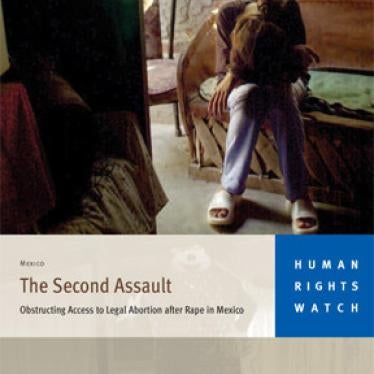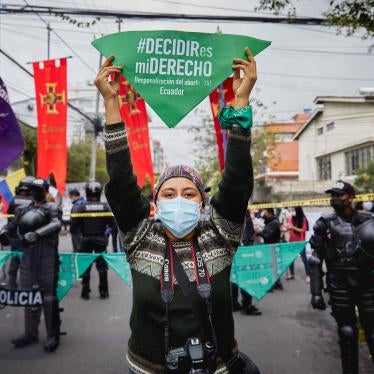Lic. Juan Manuel Oliva Ramírez, Gobernador del Estado
Lic. Gerardo Mosqueda Martinez, Secretario de Gobierno
Paseo de la Presa No. 103, 2° Piso
Guanajuato, GTO
Dear Lic. Juan Manuel Oliva Ramírez and Lic. Gerardo Mosqueda Martinez:
We are writing to you with deep concern for the human rights and reproductive health of women in Guanajuato, particularly the lack of access to safe, legal abortion in cases of pregnancies resulting from rape, and the prosecution of women who arrive at public hospitals for post-abortion care. We are also concerned with the low number of prosecutions and convictions for rape and sexual violence in Guanajuato.
We urge you to ensure timely, safe access to legal abortion for survivors of rape, and to take the necessary measures to ensure that the perpetrators of rape and sexual violence are brought to justice. We hope that during 2009 we will see an increase in the number of women who obtain access to legal abortions and the number of prosecutions and convictions for sexual violence. We urge you to pardon those who are currently serving sentences or performing community services for abortion, and to respect the right of women to access such services confidentially and safely.
For the last five years, Human Rights Watch has been documenting abuses and reproductive rights violations in the Americas. Specific to Mexico, Human Rights Watch (HRW) released a report in March 2006 entitled, "The Second Assault: Obstructing Access to Legal Abortion after Rape in Mexico." (Please see https://www.hrw.org/en/reports/2006/03/06/mexico-v-ctimas-por-partida-doble).
At the time of the interviews and data collection in 2005, Guanajuato had not authorized and performed a single legal abortion in spite of the presence of women and girls who were pregnant as a result of rape and who had sought legal termination of their crisis pregnancies. Returning nearly three years after the initial investigation, we learned that no progress had been made in gaining access to legal abortion for women who had already suffered an enormous violation of their physical security, privacy, autonomy and health.
However, there was a significant increase in the number of reported rapes in the state. According to data provided by fax and electronic mail posterior to our visit, there were 105 rapes reported in the state of Guanajuato in 2007 (25 of them against minors), and 126 (51 against minors) reported in the nine-month period from January to September 2008. Judging from available statistics and estimations worldwide, many, if not most, sexual assaults, including rape, are unreported. Therefore, the true number of rapes that occurred in Guanajuato in the last two years is likely to be much greater. With greater numbers, the likelihood that one or more pregnancies resulted from rape is also increased. Yet not a single girl or woman received authorization for a legal abortion.
Lack of access to bonafide medical services, including legal abortion following rape, is a violation of a series of the fundamental human rights of women. Ironically in Guanajuato, not only do women with a legal right to an abortion fail to realize they can access public healthcare services or are refused opportune treatment, but also women who go to public hospitals risk being arrested for seeking post-abortion care under the suspicion of having induced an abortion. Since 2000, 130 people have been tried for seeking an abortion, regardless of their circumstances. These include schoolgirls, housewives, and working women who attended public healthcare facilities for emergency attention to a medical problem and were arrested and prosecuted for an action which would be recognized in most of the world as an exercise of a basic right. We would like to know what the rate of prosecution and conviction for rape was in this same period, and what the sentences handed down were.
Moreover, we question whether arresting and sentencing girls and women for seeking abortions makes good use of limited financial and human resources. The policy of prosecuting women for inducing an abortion does nevertheless constitute a violation of a number of women's fundamental human rights.
We will be monitoring the situation and will remain in contact with you in the near future. You can hear an audio interview with one of the women currently awaiting sentencing for abortion on our website at https://www.hrw.org/en/audio/2009/02/27/castigada-por-abortar-en-m-xicoand another interview with Verónica Cruz at https://www.hrw.org/en/audio/2009/03/04/entervista-con-ver-nica-cruz. Thank you for your attention to and consideration in this matter.
Sincerely,
Angela Heimburger Verónica Cruz
Americas Researcher Co-founder and Executive Director
Women’s Rights Division Centra Las Libres de Información en Salud Sexual
Human Rights Watch Guanajuato, GTO, Mexico
New York, NY, USA






